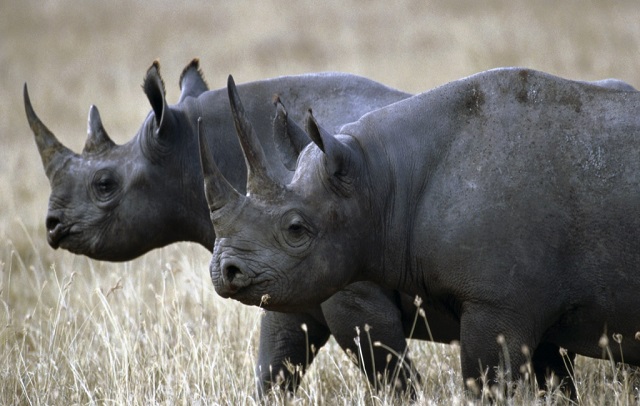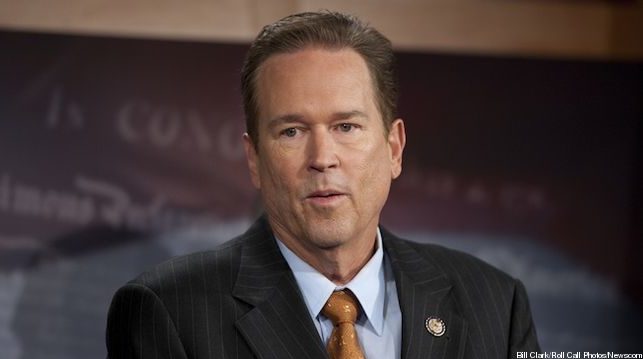U.S. Congressman Vern Buchanan (R-FL District 16) sends out email alerts to his constituents to keep them informed on what is happening in Washington, D.C. and key issues facing Floridians. Buchanan co-chairs the Florida Congressional delegation and sits on the House Committee on Ways and Means.
One recent email caught my eye. The email had the powerful titled “Mass Extinction”. When I first opened it I thought it was about Hamas wanting to destroy Israel. Buchanan is a stalwart supporter of Israel and its security. However, this email was about recent changes to the Endangered Species Act of 1973.
According to the U.S. Fish and Wildlife Service website:
The purpose of the ESA is to protect and recover imperiled species and the ecosystems upon which they depend…
Under the ESA, species may be listed as either endangered or threatened. “Endangered” means a species is in danger of extinction throughout all or a significant portion of its range. “Threatened” means a species is likely to become endangered within the foreseeable future. All species of plants and animals, except pest insects, are eligible for listing as endangered or threatened. For the purposes of the ESA, Congress defined species to include subspecies, varieties, and, for vertebrates, distinct population segments.
I thought it important to analyse Buchanan’s comments and give them some perspective. My analysis of Buchanan’s statements are indented in italics.
“Mass Extinction” by Rep. Vern Buchanan
Once a species is extinct, it’s gone forever.
Stating the obvious is interesting but not necessarily germane (relevant) to the issue. There have been many species, like the dinosaurs and most recently the West African black rhino, who have become extinct.
The majestic West African black rhino was declared extinct in 2011. The black rhino was killed off by poachers who sold its horns as an aphrodisiac. Here in the United States, the Endangered Species Act has saved an estimated 227 species from extinction, including the bald eagle, the humpback whale and the grey wolf.
The market demand for the aphrodisiac associated with rhino horns, including those of the black rhino Buchanan refers to, was created in the 1950s by Mao Zedong, the new leader of Communist China. John R. Platt from Scientific American reported, “Mao promoted so-called traditional Chinese medicine (TCM) as a tool for unifying the country he had recently come to lead. That’s when poachers descended on Africa. Between 1960 and 1995 an astonishing 98 percent of black rhinos were killed by poachers, either to feed the new and voracious demand for TCM or, to a lesser extent, for horns to be used as ceremonial knife handles in the Middle East.”
Platt reported, “In 1999 the World Wide Fund for Nature (WWF) published a report called “African Rhino: Status Survey and Conservation Action Plan.” The authors wrote of the almost insurmountable challenge in preserving these final 10 western black rhinos. “Demographically and genetically the western black rhino seems doomed unless the discrete populations are captured and concentrated in one area of its range. Under current conditions, however, this would probably make the remaining animals more vulnerable to poaching.” The act of locating, catching and collecting these rhinos in one place would also be expensive and logistically next to impossible, as Cameroon at the time was plagued by corruption, civil unrest, currency devaluation and mistrust of the West. Even if that feat had been accomplished, the land in northern Cameroon was poorly suited for rhinos and provided very little food. Providing safe habitat for just 20 rhinos would require a fenced-in sanctuary 400 square kilometers in size.”
As the WWF noted government action would not have saved the West African black rhino as the costs of doing so were “insurmountable.”
The Endangered Species Act is one of the most significant and successful environmental programs enacted in the past half century.
The National Center for Policy Analysis (NCPA) states, “The Endangered Species Act (ESA), passed in 1973, was designed to recover species to a level at which they are no longer considered endangered and therefore do not require the Act’s protection. Unfortunately, the law has had the opposite effect on many species. The ESA can severely penalize landowners for harboring species on their property, and as a result many landowners have rid their property of the species and habitat rather than suffer the consequences.” [Emphasis mine]
I wanted to let you know of an important – and unfortunate – vote that took place in the U.S. House of Representatives this week. Over my strong objections, the U.S. House voted to weaken the Endangered Species Act.
I was one of eight Republicans to oppose this misguided bill, which was soundly criticized by the Sierra Club, the U.S. Humane Society, the League of Conservation Voters and many other environmental groups.
On the Board of Directors of the League of Conservation, an environmental lobbying group, is Carol Browner, Chair Center for American Progress. Ms. Browner most recently served as Assistant to President Obama and director of the White House Office of Energy and Climate Change Policy, where she oversaw the coordination of environmental, energy, climate, transport, and related policy across the federal government.
The National Review’s Wesley J. Smith in his column “The Sierra Club’s War on Humans” writes, “Take a new book being promoted by the once sane Sierra Club that advocates cutting the work week in half so that we can all live less prosperous lives. From the promotion of the book Time on Our Side in Sierra magazine:
“There’s no such thing as sustainable growth, not in a country like the U.S.,” Worldwatch senior fellow Erik Assadourian says. “We have to de-grow our economy, which is obviously not a popular stance to take in a culture that celebrates growth in all forms.
But as the saying goes, if everyone consumed like Americans, we’d need four planets.” Whether you move to a smaller house or an apartment, downsize to one or no car, or simply have fewer lattes to-go, a smaller paycheck could reduce consumption overall…
Shorter workweeks could mean more time for psychologically gratifying pursuits such as gardening, reading, or biking.In other words, we should intentionally become poorer in order to save the planet. [Emphasis mine]
This bill will divert money away from saving wildlife for the purpose of creating a reporting database of highly questionable value. In fact, this new “transparency” actually could put endangered species at greater risk of poaching by publicizing the nesting sites and specific location of threatened wildlife. The bill also waters down the definition of “best available science” by requiring federal agencies to utilize all information submitted by cities, counties and tribes even if the data is unscientific, flawed and inaccurate.
The NCPA notes, “Over 1,900 species of plants and animals — 1,351 domestic and 570 foreign — are currently considered by the federal government to be in danger of extinction. Once a species is listed, they are subject to a variety of conservation efforts, including federal recovery plans that can include a wide variety of measures including habitat protection. However, these conservation efforts rarely, if ever, consider the total costs of species recovery to federal, state or local governments, and especially to private landowners. The greatest problem with the Act is its land-use control provisions.”
The Executive Director of the Endangered Species Coalition said the bill “makes a mockery of science” and “prevents species from getting critically needed safeguards.” It passed the House 233-190 and now heads to the U.S. Senate. Fortunately, it is not expected to gain any traction in the Senate.
The Endangered Species Coalition (ESC) is a political action group much in line with the Sierra Club and League of Conservation. Brock Evans joined ESC in 1997 as the Executive Director and President of the Endangered Species Coalition. Prior to assuming leadership of the ESC, Evans served as Vice President for National Issues for the National Audubon Society for 15 years. Earlier, he had served for eight years as Director (head lobbyist) of the Sierra Club’s Washington DC Office.
Member groups include the Sierra Club, Greenpeace, Earth Action Network and 1000 Friends of Florida.
Promoting the preservation of animal and plant species should be a bipartisan issue important to all of us. Since its enactment in 1973, the Endangered Species Act been so successful that 99 percent of the species placed under its protection have been saved from extinction.
The National Center for Policy Analysis disputes what Buchanan states. NCPA reports:
The ESA’s punitive nature also helps explain the Act’s sorry record conserving species. Proponents of the ESA cite species that have recovered due to the Act. Yet, almost invariably these claims are untrue or exaggerated. For example, the U.S. Fish and Wildlife Service officially claims 46 delisted species — 19 due to recovery, 17 due to data error, 9 due to extinction and one due to partial recovery/data error. In reality, the delistings were due to the following:
- Twenty-seven species have been removed due to data error — including the American alligator, which was delisted soon after its initial listing because it was found to be abundant, clearly indicating it was never endangered and was improperly surveyed.
- Nine species were determined to be extinct.
- Five species were delisted due primarily to factors unrelated to the ESA, including the ban on the pesticide DDT.
- Five species were delisted for a variety of other reasons including: private conservation; state, not federal, conservation efforts; and recovery despite harm done by the ESA.
Congress and others have offered cosmetic reforms to improve the ESA’s effectiveness — tacitly admitting that the Act’s punitive approach has failed and that new approaches are needed. However, these reforms will do little to remove the penalties that undermine the ESA.
The key to future success for endangered species protection is to set a new course based on the recognition that landowners will be cooperative and even helpful when they benefit from, or are at least are not harmed by, conservation initiatives. This means stripping the ESA of its land-use controls. [Emphasis mine]
Earlier this year, I was honored to receive the U.S. Humane Society’s Legislative Leader award for my record in Congress. I will continue to be a strong advocate for the Endangered Species Act and fight to preserve our wildlife and ecosystems now and in the future.
Steve Foley from the California Report writes, “In parts of New Mexico children have no choice but to wait for their school bus inside of cages. These ‘kid cages’ are the result of government agencies abuse of the Endangered Species Act. The United States Fish & Wildlife Service has placed wolves in populated areas where they have become an economic burden for small business owners, infringed upon private property rights, burdened taxpayers with management costs, and placed fear in the hearts of those who have to deal with them on a daily basis.”
Please let me know what you think,
Vern
If you would like to email Representative Buchanan on this issue please use his online contact form. You may also call or visit one of his offices located in Washington, D.C., Bradenton, FL and Sarasota, FL.
RELATED ARTICLE: Op-Ed: ‘Climate-Smart’ Policies for Africa are Stupid and Immoral
RELATED VIDEO:
Wolves in Government Clothing
EDITORS NOTE: The featured image of two West African black rhinos is courtesy of StreamAfrica.com.





